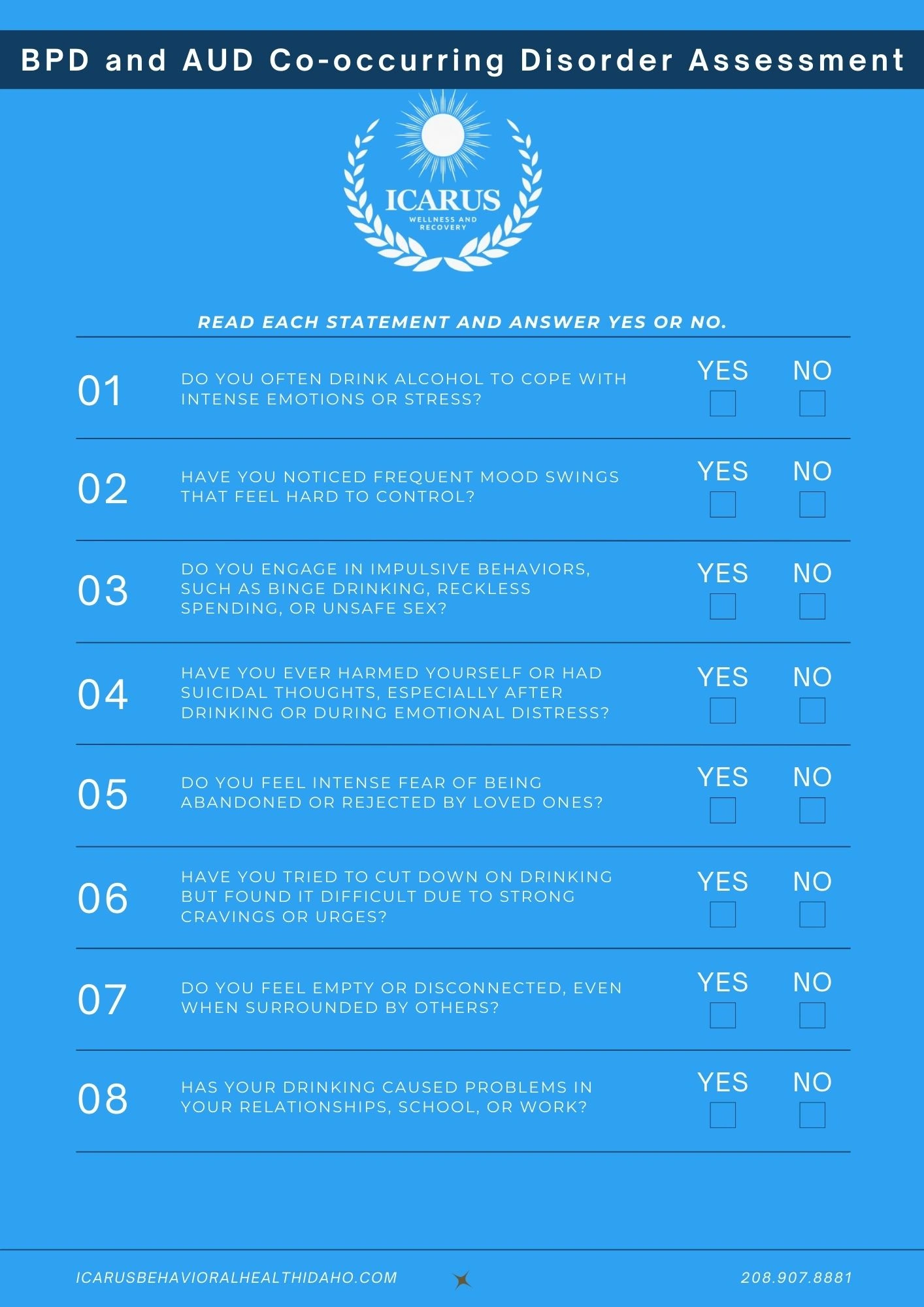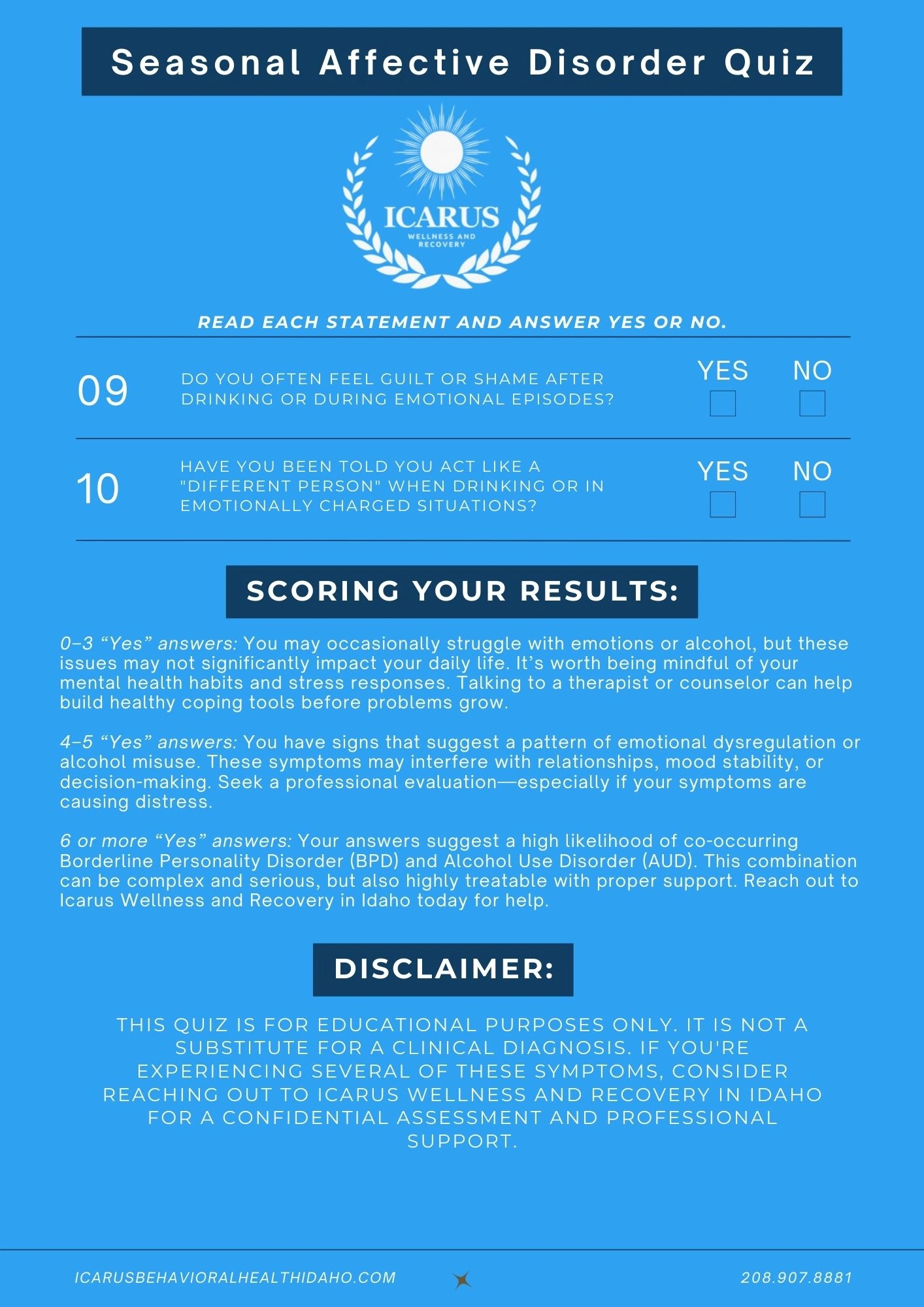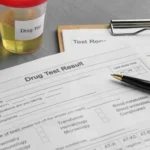BPD and Alcohol Use Disorder Connections
The Relationship Between Alcoholism and Borderline Personality Disorder
Table of Contents
ToggleDoes it feel like BPD and alcohol use disorder connections are taking a wrecking ball to your life?
This is not unusual, and many with Borderline Personality Disorder (BPD) turn to drug or alcohol dependence to calm their mood swings or relieve their core symptoms. Often, occasional alcohol abuse turns into an alcohol use disorder, driving further emotional instability and worsening the personality disorder.
You’re not imagining the wrecking ball effect – it’s real. The silver lining is that you can rebuild. Icarus Recovery and Wellness in Boise, Idaho, has successfully treated BPD with alcohol addiction in past clients.
Our JCAHO-accredited, state-certified treatment options provide customized care to help individuals with BPD and alcohol use disorder as they recover. The result is more balance, a better self-image, and managed symptoms of BPD.
If your mental health is suffering because of alcohol misuse and borderline personality disorder (BPD), please continue reading. We’ll help you understand the interconnectedness of alcohol use disorder and BPD, and help you see how evidence-based treatment options can help restore daily functioning.
Understanding Co-occurrences Between BPD and Alcohol Use Disorder
Borderline personality disorder and alcohol use disorder often appear together in clinical settings. Their co-existence is not a coincidence.
People with borderline personality disorder often struggle with intense emotions, have unstable relationships, and engage in impulsive behaviors. They have a greater risk factor for alcohol use as a way to self-soothe. Drinking over time can progress into alcohol dependency and kickstart a cycle that reinforces the worst of both conditions.
Why Borderline Personality Disorder Increases the Risk of Alcohol Dependence
People who live with borderline personality disorder often struggle with emotional regulation and interpersonal relationships.
Alcohol offers brief breaks in the stress that comes from the emotional extremes. But the escape also leads to tolerance, needing more alcohol or drinking more often to get that relief.
How Alcohol Affects BPD Symptoms and Emotional Regulation
Alcohol is a central nervous system depressant and is a diagnosable substance use disorder. Alcoholism is frequent in people with borderline personality disorder.
It can worsen symptoms of BPD, including mood swings, impulsive behavior, and a sense of emptiness. Over a longer period, it can also cause thoughts of self-harm or suicide.
In fact, one study reported that women with both BPD and substance use had more intense emotions; it also found that dialectical behavioral therapy treatment improved emotional control and led to drinking less often.
Mental Disorders That Commonly Co-Occur With BPD
It’s unusual for borderline personality disorder to exist without other mental health concerns. Many with borderline personality disorder also have other mental illnesses, including depression, anxiety, binge eating disorder, or other disorders. At Icarus Idaho, we diagnose and treat each co-occurring diagnosis to help clients stop drinking and learn to manage their BPD symptoms for life.
The Role of Brain Chemistry in BPD and Alcohol Use
Both BPD and AUD are impacted by brain chemistry imbalance, especially fluctuations of serotonin, dopamine, and cortisol. Those are the naturally occurring chemicals that dictate mood, stress response, and emotions.
When these pathways misfire, it can intensify borderline personality disorder symptoms and start a cycle of alcohol or drug abuse to self-regulate emotions.
Trauma and Family History as Shared Risk Factors for Alcohol Abuse and BPD
Genetics appear to be a factor in the combination of alcohol use and borderline personality disorder. National Institute of Health (NIH) studies suggest that individuals with BPD who have a family history or trauma, addiction, or mental health issues are at a higher risk of also developing alcohol use disorder or other substance use disorders.
Additional research shows that having a close biological relative with BPD or substance use disorder increases the likelihood of emotional instability. Its also worth noting that the connections between BPD and alcoholism often appear during early adulthood.
Impulsivity, Self-Harm, and Substance Abuse in BPD
The impulsive nature of intense emotional reactions can lead individuals with BPD to engage in dangerous behaviors. These could be self-harmful behaviors, reckless driving, or unsafe sex. These maladaptive coping strategies are also symptoms that point toward the need for finding treatment.
Get Effective outpatient Rehab Options at Icarus IDAHO
The Symptoms of AUD, BPD, and Where They Overlap
Borderline personality disorder and alcohol addiction can co-occur and overlap. This table demonstrates the intersectionality between alcoholism and BPD:
| SYMPTOMS | BPD | AUD |
| Moodiness | x | |
| Impulsivity | x | x |
| Depression | x | x |
| Anxiety | x | x |
| Self-harm or suicidal ideation | x | |
| Reckless driving | x | x |
| Intense fear of abandonment | x | |
| Desire to use substances | x | |
| Emotionally unstable | x | x |
| Memory loss | x | |
| Aggressive outbursts | x | x |
| Poorly controlled impulses | x | x |
| Strained or challenging relationships | x | x |
| Low self-esteem | x | x |
Take Our AUD BPD Self-Assessment to Check Your Symptoms


Do you think you might need help with alcohol misuse and AUD? Our BPD AUD self-assessment can help you decide if it’s time to get professional help from a licensed mental health provider.
Please note that this short quiz is not a diagnostic tool; nor does it provide you with an accurate diagnosis. After completing your self-assessment, please contact admissions to schedule a more in-depth assessment.
The Dangers of Using Alcohol to Cope With Emotional Pain
Alcohol is dangerous when it becomes someone’s go-to method of managing overwhelming emotions or negative shifts in self-image.
Drinking may soothe the feelings initially, but the relief is fleeting. As cravings become stronger, the alcohol addiction may also cancel out healthier coping tools. That delays the recovery journey and makes emotional regulation more challenging than ever before.
Co-Occurring BPD and Alcohol Complicates Recovery
The common form of dual diagnosis – borderline personality disorder and alcohol use disorder – complicates the person’s treatment plan. Each condition plays into the other. Each condition increases the severity of the other, with substance abuse deepening BPD or underlying trauma.
Dual Diagnosis Treatment for BPD and Alcohol Use Disorder
Icarus Recovery and Wellness Idaho uses a dual diagnosis approach in supporting individuals with BPD and alcohol addiction. We address not just surface-level symptoms but also root causes. We then devise effective treatment plans that address each of the conditions simultaneously. This comprehensive care helps people make tremendous gains in emotional and impulse control and long-term resilience.
How Therapy Can Help Manage Both Mental Disorders Effectively
Icarus Idaho believes in taking evidence-based therapeutic approaches in helping individuals with BPD and alcoholism. We use therapies including dialectical behavior therapy (DBT) and cognitive behavioral therapy to address underlying thought processes and harmful self-beliefs.
Therapists and counselors also help clients learn the skills needed for emotional awareness, controlling impulsive behaviors, and relapse prevention. The goal of each of our mental health programs is sustained recovery.
Jana Is a Borderline Personality Disorder Success Story
‘Jana,’ 26, came to Icarus, Idaho, about two years after receiving a borderline personality disorder diagnosis. As a teenager, others had described Jana as high-strung or edgy. But the truth was that Jana had often felt isolated and anxious since middle school.
By her late teens, Jana had experimented with drugs and alcohol to calm her anxiety. When she received her official borderline personality diagnosis, she thought she’d be able to take some pills to get well. It turned out that BPD was not as simple as some other mental health disorders – the best she could do was learn to manage it.
She turned back to substance abuse again and developed an alcohol addiction. While it made her feel calm for short periods, she always felt even worse after drinking. The addiction progressed until it became clear that Jana needed help from experienced alcoholism recovery professionals.
Getting the Support for Recovery from Alcoholism and BPD at Once
At a facility near Icarus Idaho, Jana went through a medical detox process; it wasn’t as bad as she’d anticipated, and the medications they gave made the nausea tolerable. Once substance-free, Jana started individual and group counseling, where she began to understand that borderline personality disorder was not curable in the traditional sense. Rather, it was a controllable condition that she would have to manage for the rest of her life.
Jana wanted to experience the best things in life, and she wouldn’t let borderline personality disorder get in her way. She applied herself in therapy, learned how to avoid and manage triggers, and started learning yoga to manage her stress. She flourished and completed her addiction treatment program with flying colors.
Today, Jana is holding down a full-time job with great benefits – something she once had believed would be impossible. She’s enjoying new friends and is pursuing a new possibility – becoming a yoga instructor herself.
Up To 100% of Rehab Costs Covered By Insurance
Contact Icarus Idaho for Evidence-Based BPD and Alcohol Treatment
Recovery doesn’t have to be hard. With Icarus Idaho, you have an ally on your side from day one. Our addiction and BPD treatment programs will help you reclaim sobriety and achieve a healthy life balance.
We’re here 24 hours a day to answer your questions – call us today! Every call is kept strictly confidential, so please reach out for our support now.
Recent Post
-
15 Recovery Journal Prompts (You Can Really Use!)
-
Is Kratom Legal in Idaho?
-
 Our REBT Therapy Worksheets and PDF
Our REBT Therapy Worksheets and PDF -
Our IFS Therapy Worksheets and PDF Resources
-
What Happens If You Fail A Drug Test on Probation in Idaho or Nationwide?
-
Can You Check Yourself Out of Rehab?
-
How Long Does Alcohol Stay in Saliva?
-
Does Medicaid Cover Rehab in Idaho?
-
Our Cognitive Processing Therapy Worksheets to Support Recovery
-
What Is The Fentanyl Fold?
-
Can BPD Cause Hallucinations and Psychosis?
-
Does Tricare Cover Dual-Diagnosis Treatment?
-
Can You Have BPD and Bipolar Disorder?
-
How Long Does Alcohol-Induced Depression Last?
-
Seasonal Affective Disorder and Alcohol
















